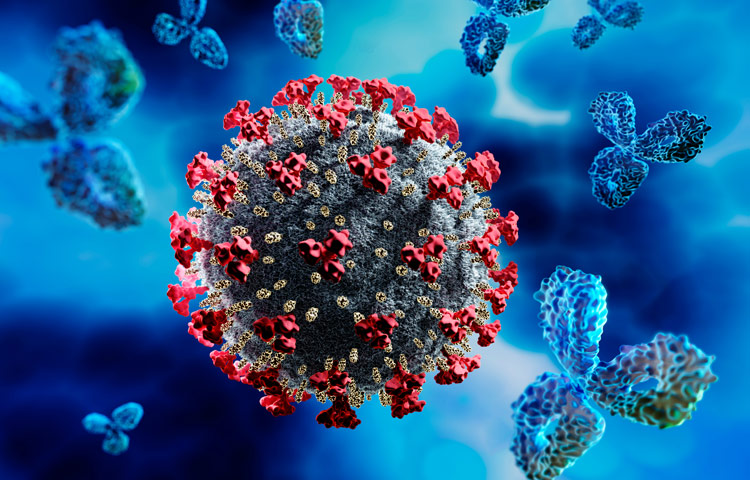There are now two experimental vaccines for COVID-19 that are more than 90% effective—a remarkable development that has made the world collectively exhale. We caught up with our leading COVID-19 researchers to get their take on the update—including whether we are “out of the woods” and where they were when they heard the news.
Sumit Chanda, PhD, virologist
I was at work, obsessively refreshing my browser to follow the election results when the first press release about the Pfizer vaccine popped up. When I heard 90% efficacy, I was super excited. I had sort of a sigh of relief. Then I read the fine print, and I started to have more guarded optimism. I’m not popping the champagne yet. But I’m putting it on ice.
The 90% measurement was taken starting only one week after the second booster shot. That’s not a lot of time, and with a pretty small number of people. What I am really looking for is how many people are protected two months and six months after the booster shot. That’s when I’m going to get really excited. We know that 90% is the ceiling, now we need to know where the floor is. Even if efficacy drops from 90 to 70%, that is still really great.
This is also why we will likely need multiple vaccines, and with different mechanisms of protection. This vaccine also has to be kept at -70 degrees Celsius, which presents a logistical challenge to say the least. Most doctor’s offices don’t have this type of specialized equipment, not to mention rural areas or less developed countries.
Today’s news that the Moderna vaccine is at least as effective as Pfizer’s is equally great news. However, we are still going to need antivirals. Between people who may not respond to these vaccines, can’t get the vaccines, or simply don’t want to take them, there is still going to be a lot of people who catch COVID-19. Luckily there are some antiviral options that are looking really good, including an antibody from Lilly that just got Emergency Use Authorization from the FDA.
With all this said, this is unequivocally good news. I am optimistic that we will have several vaccines that are usable in the next couple months. But for now, we need to mask up and keep social distancing.
Step inside Sumit Chanda’s lab where he and his colleagues are racing to find a potential treatment for COVID-19.
Carl Ware, PhD, immunologist and clinical trial participant
I first heard the news about the Pfizer vaccine on the radio when I was listening to KPBS’ surf report (Scott Bass is a poet). As an immunologist studying coronaviruses and a volunteer in the Moderna vaccine trial, I’m following all of the results closely. I immediately turned the volume up.
The news is very encouraging, and certainly shines a brighter light at the end of the proverbial tunnel. 90% effectiveness is very impressive. My excitement is mostly based upon earlier trial results showing that the vaccines are safe and effective in stimulating the immune system. However, those trials only involved several hundred people in comparison to the tens of thousands of volunteers in the latest results, so these developments are very encouraging. It gives us a much better understanding of how the vaccine may work in the general population.
However, questions will need to be answered about the efficacy in people over the age of 65 and other susceptible populations, the longevity of immunity, and long-term safety. Fortunately, these results will be scrutinized by scientists that are the best in the world. I have full confidence in their analysis.
The effort to make a vaccine so quickly is truly an outstanding accomplishment. It’s not a race to be first, but first to stop the virus. This war against an unseen enemy will require multiple strategies to truly end this pandemic. Right now I am keeping an eye out for data that shows the long-term protection of these vaccines, and looking forward to results from my colleague Sumit Chanda, who has been racing to find existing drugs that could treat people who do become sick with COVID-19.
NBC San Diego spoke with Dr. Carl Ware about his experience participating in a clinical trial testing Moderna’s vaccine for COVID-19.
Laura Martin-Sancho, PhD, virologist
I learned about the Pfizer-BioNTech vaccine news last Monday morning. I had just woken up and was enjoying a cup of coffee when I read the press release. Here, they reported the results to date of their vaccine clinical trial showing 90% protection from COVID-19 infection. I felt very happy and very hopeful. Being from Spain, one of the countries that has been most affected by COVID-19, and having all my family over there, I felt this was the news we all have been waiting for a long time.
While this 90% might not hold by the end of the trial as more cases are reported, it still brings a lot of hope. Especially since many vaccines currently under clinical trials, including Moderna’s, use a similar approach. So we have even more reasons to be optimistic.
Future challenges for these vaccines will be to determine if they can prevent transmission from asymptomatic people with COVID-19. As clinical trial participants were not tested for COVID-19 throughout the study, and only symptomatic cases were reported, the question remains as to whether vaccinated people can still transmit the disease.
We also still don’t know how long the protection elicited by the vaccine lasts, which will determine whether and how frequently we will need a vaccine boost. In addition, more data are needed to evaluate if these vaccines can protect against severe COVID-19 or whether different age groups or ethnicities are protected. Only time will tell.
Meet the scientists on the front lines with coronavirus, including Dr. Martin-Sancho.
